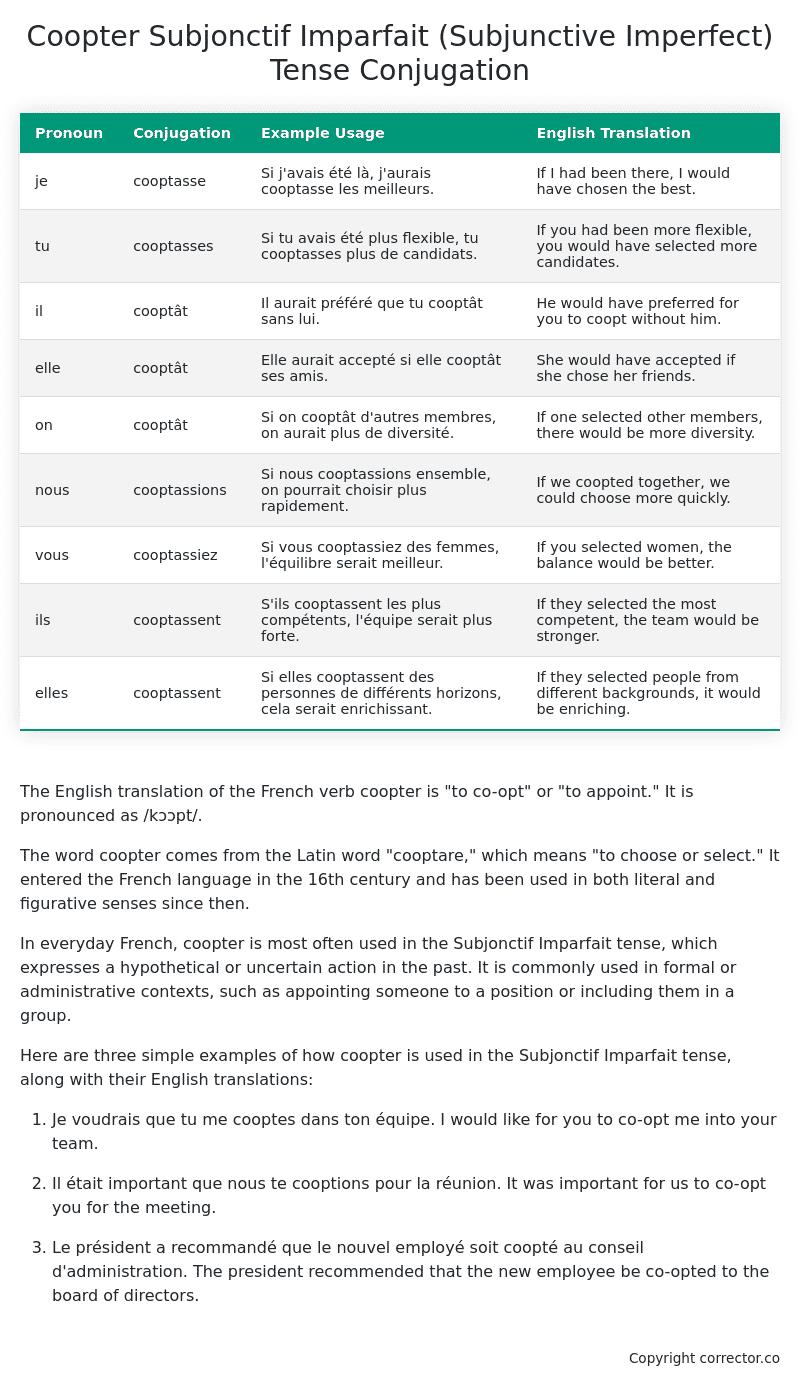Subjonctif Imparfait (Subjunctive Imperfect) Tense Conjugation of the French Verb coopter
Introduction to the verb coopter
The English translation of the French verb coopter is “to co-opt” or “to appoint.” It is pronounced as /kɔɔpt/.
The word coopter comes from the Latin word “cooptare,” which means “to choose or select.” It entered the French language in the 16th century and has been used in both literal and figurative senses since then.
In everyday French, coopter is most often used in the Subjonctif Imparfait tense, which expresses a hypothetical or uncertain action in the past. It is commonly used in formal or administrative contexts, such as appointing someone to a position or including them in a group.
Here are three simple examples of how coopter is used in the Subjonctif Imparfait tense, along with their English translations:
-
Je voudrais que tu me cooptes dans ton équipe.
I would like for you to co-opt me into your team. -
Il était important que nous te cooptions pour la réunion.
It was important for us to co-opt you for the meeting. -
Le président a recommandé que le nouvel employé soit coopté au conseil d’administration.
The president recommended that the new employee be co-opted to the board of directors.
Table of the Subjonctif Imparfait (Subjunctive Imperfect) Tense Conjugation of coopter
| Pronoun | Conjugation | Example Usage | English Translation |
|---|---|---|---|
| je | cooptasse | Si j’avais été là, j’aurais cooptasse les meilleurs. | If I had been there, I would have chosen the best. |
| tu | cooptasses | Si tu avais été plus flexible, tu cooptasses plus de candidats. | If you had been more flexible, you would have selected more candidates. |
| il | cooptât | Il aurait préféré que tu cooptât sans lui. | He would have preferred for you to coopt without him. |
| elle | cooptât | Elle aurait accepté si elle cooptât ses amis. | She would have accepted if she chose her friends. |
| on | cooptât | Si on cooptât d’autres membres, on aurait plus de diversité. | If one selected other members, there would be more diversity. |
| nous | cooptassions | Si nous cooptassions ensemble, on pourrait choisir plus rapidement. | If we coopted together, we could choose more quickly. |
| vous | cooptassiez | Si vous cooptassiez des femmes, l’équilibre serait meilleur. | If you selected women, the balance would be better. |
| ils | cooptassent | S’ils cooptassent les plus compétents, l’équipe serait plus forte. | If they selected the most competent, the team would be stronger. |
| elles | cooptassent | Si elles cooptassent des personnes de différents horizons, cela serait enrichissant. | If they selected people from different backgrounds, it would be enriching. |
Other Conjugations for Coopter.
Le Present (Present Tense) Conjugation of the French Verb coopter
Imparfait (Imperfect) Tense Conjugation of the French Verb coopter
Passé Simple (Simple Past) Tense Conjugation of the French Verb coopter
Passé Composé (Present Perfect) Tense Conjugation of the French Verb coopter
Futur Simple (Simple Future) Tense Conjugation of the French Verb coopter
Futur Proche (Near Future) Tense Conjugation of the French Verb coopter
Plus-que-parfait (Pluperfect) Tense Conjugation of the French Verb coopter
Passé Antérieur (Past Anterior) Tense Conjugation of the French Verb coopter
Futur Antérieur (Future Anterior) Tense Conjugation of the French Verb coopter
Subjonctif Présent (Subjunctive Present) Tense Conjugation of the French Verb coopter
Subjonctif Passé (Subjunctive Past) Tense Conjugation of the French Verb coopter
Subjonctif Imparfait (Subjunctive Imperfect) Tense Conjugation of the French Verb coopter (this article)
Subjonctif Plus-que-parfait (Subjunctive Pluperfect) Tense Conjugation of the French Verb coopter
Conditionnel Présent (Conditional Present) Tense Conjugation of the French Verb coopter
Conditionnel Passé (Conditional Past) Tense Conjugation of the French Verb coopter
L’impératif Présent (Imperative Present) Tense Conjugation of the French Verb coopter
L’infinitif Présent (Infinitive Present) Tense Conjugation of the French Verb coopter
Struggling with French verbs or the language in general? Why not use our free French Grammar Checker – no registration required!
Get a FREE Download Study Sheet of this Conjugation 🔥
Simply right click the image below, click “save image” and get your free reference for the coopter Subjonctif Imparfait tense conjugation!

Coopter – About the French Subjonctif Imparfait (Subjunctive Imperfect) Tense
Formation
Common Everyday Usage Patterns
Interactions with Other Tenses
Subjonctif Présent
Indicatif Passé Composé
Conditional
Conditional Perfect
Summary
I hope you enjoyed this article on the verb coopter. Still in a learning mood? Check out another TOTALLY random French verb conjugation!


